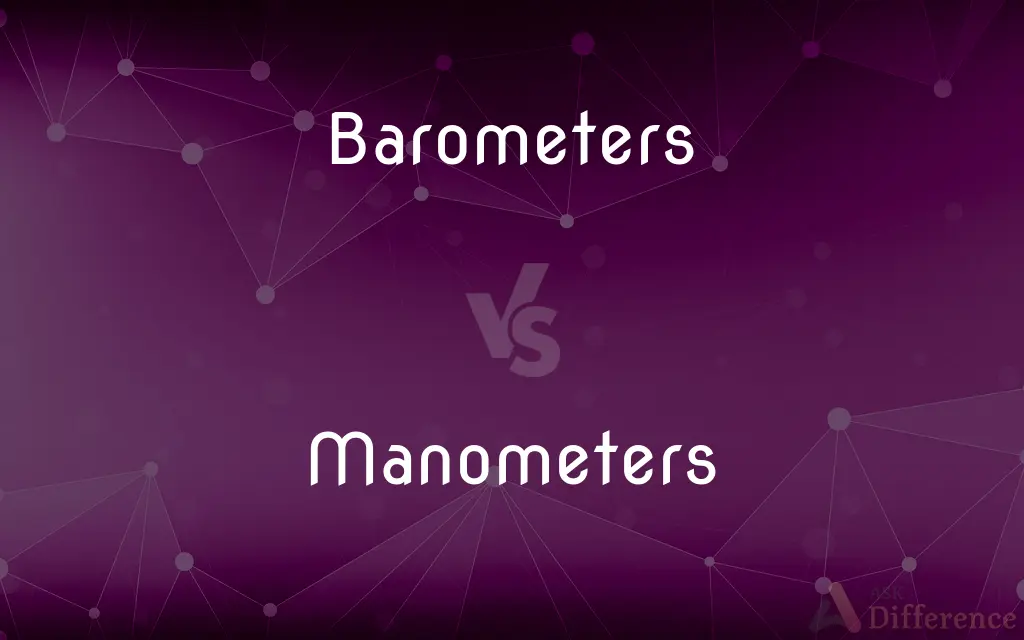Barometers vs. Manometers — What's the Difference?
By Tayyaba Rehman — Published on January 28, 2024
Barometers measure atmospheric pressure to forecast weather and altitude, using mercury or aneroid mechanisms. Manometers measure pressure of gases or liquids, often in closed systems, using fluid columns.

Difference Between Barometers and Manometers
Table of Contents
ADVERTISEMENT
Key Differences
Barometers are instruments designed to measure atmospheric pressure, a key factor in weather forecasting and determining altitude. Manometers, however, are used to measure the pressure of gases or liquids, primarily in scientific and industrial applications.
A typical Barometer might use mercury in a glass tube or an aneroid (without liquid) system. In contrast, a Manometer usually consists of a U-shaped tube filled with a fluid like mercury or water, measuring pressure based on fluid displacement.
Barometers provide valuable data in meteorology, aiding in predicting weather changes by monitoring changes in air pressure. Manometers, on the other hand, are often found in laboratory settings or industries, used for testing gas pressure in pipes or tanks.
The readings from a Barometer can indicate imminent weather conditions, like approaching storms or fair weather. Manometers are more focused on providing precise measurements of pressure differential, crucial in process control or troubleshooting in various systems.
While Barometers are widely used in navigation, aviation, and meteorology for their atmospheric pressure readings, Manometers are indispensable tools in engineering, particularly in fields dealing with fluid dynamics and pneumatics.
ADVERTISEMENT
Comparison Chart
Primary Use
Measuring atmospheric pressure
Measuring pressure of gases and liquids
Key Applications
Weather forecasting, altitude determination
Scientific research, industrial processes
Operating Principle
Mercury or aneroid mechanism
U-shaped tube with fluid, indicating pressure
Importance in Fields
Meteorology, aviation, navigation
Engineering, fluid dynamics, pneumatics
Measurement Indication
Changes in weather, air pressure
Pressure differentials in systems
Compare with Definitions
Barometers
A device used in forecasting weather.
The falling reading on the Barometer suggested an approaching storm.
Manometers
An instrument used in fluid dynamics studies.
In the lab, students used Manometers in their fluid mechanics experiments.
Barometers
An instrument for measuring atmospheric pressure.
The pilot checked the Barometer before takeoff to gauge the weather conditions.
Manometers
A device for measuring the pressure of gases or liquids.
The technician used a Manometer to check the gas pressure in the pipeline.
Barometers
A tool, either mercury-based or aneroid, for atmospheric assessment.
The old ship had a traditional mercury Barometer hanging in the cabin.
Manometers
A tool for precise pressure measurements in industrial settings.
The factory's safety protocol included regular Manometer readings of the boilers.
Barometers
A device for monitoring air pressure trends.
Meteorologists rely on Barometers for predicting weather patterns.
Manometers
A gauge for measuring pressure differences in systems.
Engineers use Manometers to ensure proper pressure levels in HVAC systems.
Barometers
An instrument that can indicate altitude changes.
Hikers used a Barometer to determine their elevation above sea level.
Manometers
A U-shaped tube filled with fluid for pressure assessment.
The Manometer's fluid level indicated a significant pressure change in the tank.
Barometers
An instrument for measuring atmospheric pressure, used especially in weather forecasting.
Manometers
An instrument used for measuring the pressure of liquids and gases.
Barometers
Something that registers or responds to fluctuations; an indicator
Opinion polls serve as a barometer of the public mood.
Manometers
A sphygmomanometer.
Barometers
Plural of barometer
Manometers
Plural of manometer
Common Curiosities
Are Barometers used in aviation?
Yes, they're crucial for altitude determination and weather assessment in aviation.
How does a Manometer indicate pressure?
It uses the displacement of fluid in a U-shaped tube to indicate pressure.
Can Barometers predict weather changes?
Yes, changes in air pressure readings can indicate approaching weather systems.
What does a Barometer measure?
It measures atmospheric pressure.
What is the purpose of a Manometer?
It's used to measure the pressure of gases or liquids.
Where are Manometers commonly used?
They are used in laboratories, industrial processes, and fluid dynamics studies.
Are Barometers still relevant in modern meteorology?
Yes, they remain an essential tool in modern meteorological practices.
Can altitude affect Barometer readings?
Yes, atmospheric pressure changes with altitude, affecting readings.
Can Manometers measure very high pressures?
Yes, especially those designed for industrial applications.
Are digital Manometers available?
Yes, digital versions provide more precise and easier readings.
What principle does a mercury Barometer operate on?
It operates on the principle of atmospheric pressure balancing a mercury column.
Are Manometers used in HVAC systems?
Yes, they are commonly used for pressure measurements in HVAC systems.
Is specialized training required to use a Barometer?
Basic training is sufficient for most types, though understanding meteorological principles enhances its use.
Do Barometers need calibration?
Yes, especially the aneroid type, to maintain accuracy.
Can Manometers be used for troubleshooting?
Yes, they are often used for troubleshooting pressure issues in systems.
Share Your Discovery

Previous Comparison
IIR Filters vs. FIR Filters
Next Comparison
UNION vs. UNION ALLAuthor Spotlight
Written by
Tayyaba RehmanTayyaba Rehman is a distinguished writer, currently serving as a primary contributor to askdifference.com. As a researcher in semantics and etymology, Tayyaba's passion for the complexity of languages and their distinctions has found a perfect home on the platform. Tayyaba delves into the intricacies of language, distinguishing between commonly confused words and phrases, thereby providing clarity for readers worldwide.













































